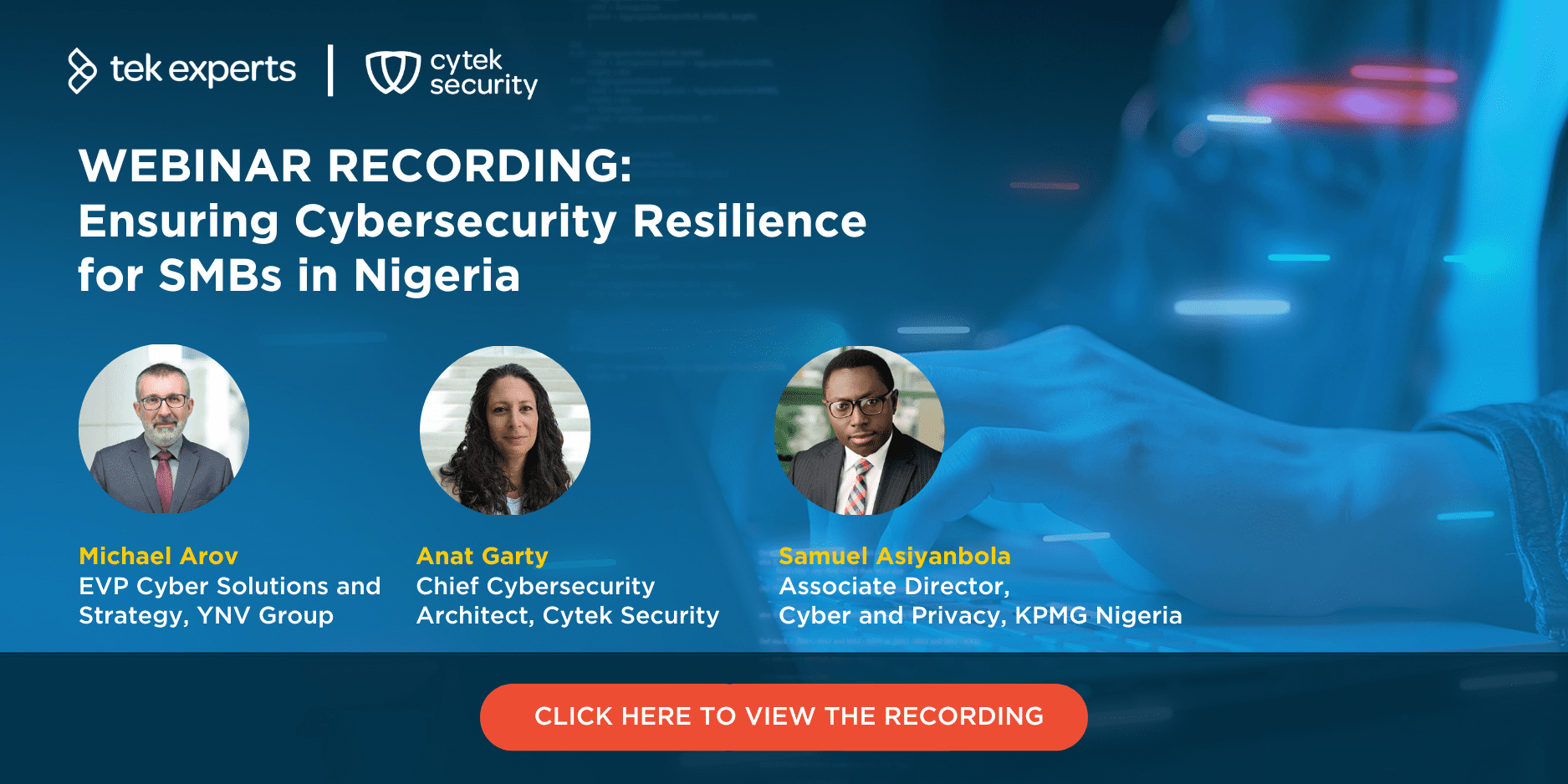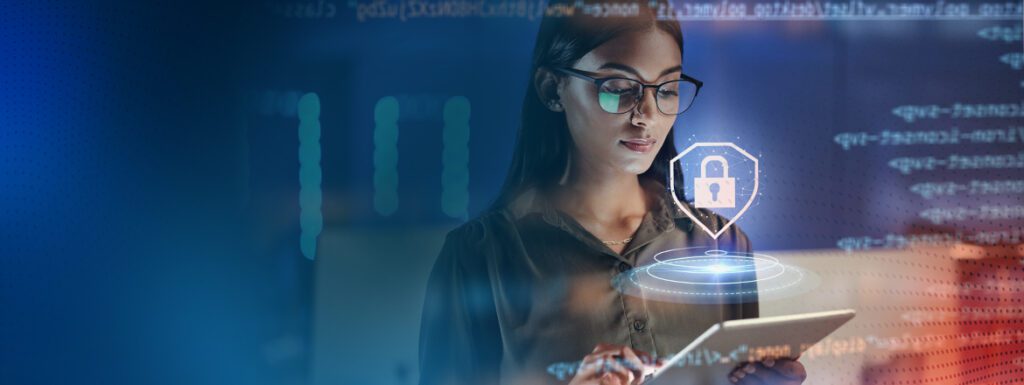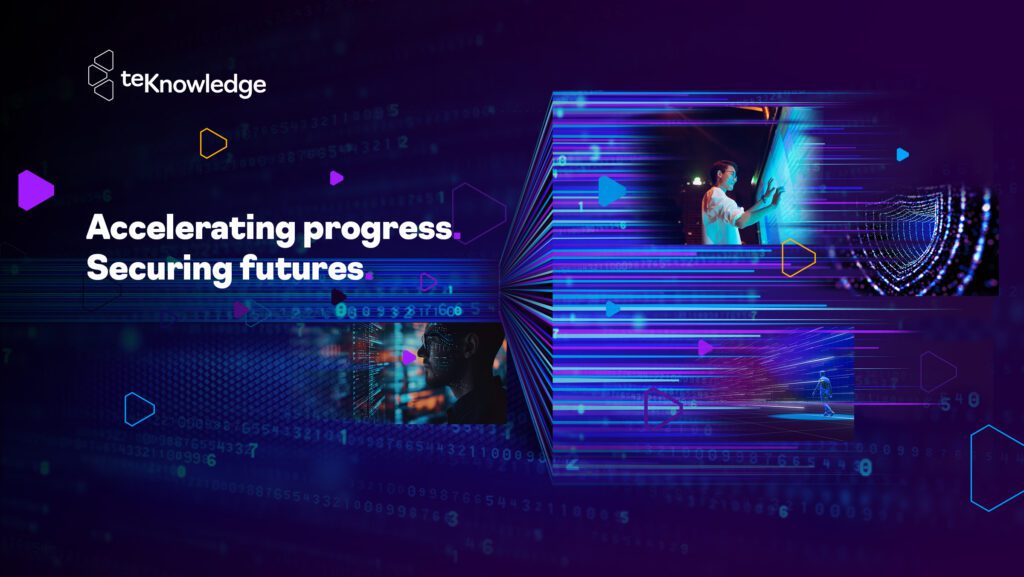ABOUT US
Cytek Security provides state-of-the-art cybersecurity solutions, delivered by the world’s top cyber experts. This includes advisory and implementation services, managed security services, and capability building.
Nigeria’s small and medium-sized businesses (SMBs) play a crucial role in the country’s economy, contributing 48% to the national GDP and constituting 96% of businesses and 84% of employment, according to International Labour Organization. With their increasing role in the economy, they have also become a target of cybercrime, making it crucial for them to prioritize building and strengthening cyber defenses.
During our recent webinar “Ensuring Cybersecurity Resilience for Small and Medium Businesses in Nigeria” we discussed strategies and available solutions for SMBs in Nigeria with top cybersecurity experts. Here are the key takeaways:
1. The Growing Threat Landscape
Data breaches in Nigeria saw a concerning 64% increase, highlighting the escalating cybersecurity challenges faced by businesses. According to IBM, the average data breach cost for organizations with fewer than 500 employees is a staggering $3.31 million. SMBs are particularly vulnerable due to several factors:
- Limited Resources: SMBs typically have smaller budgets and fewer resources dedicated to cybersecurity. This limitation can result in a need for robust cybersecurity measures, making them easier targets for cybercriminals.
- Lack of Expertise: Small businesses may need dedicated IT staff with expertise in cybersecurity. This can lead to inadequate implementation of security measures and a lack of awareness about potential threats.
- Insufficient Training and Awareness: Employees in SMBs may need more training on cybersecurity best practices. This lack of awareness can result in unintentional security breaches, such as falling for phishing attacks or using weak passwords
- Misconception of Being Unnoticed: Some SMBs may believe they are too small to attract the attention of cybercriminals. However, automated tools and bots constantly scan the internet for vulnerabilities, making all businesses potential targets.
2. Challenges Facing Small and Medium Businesses in Nigeria
The webinar shed light on the challenges SMBs face in Nigeria, including a need for more awareness, talent gaps, and funding constraints. According to a Surfshark report, Nigeria was the 32nd most breached country in 2023, including an alarming rise in cyber attacks targeting small and medium businesses.
While SMBs are often targeted by cyber criminals, these businesses face formidable challenges when it comes to cybersecurity:
- Lack of Awareness: One of the primary challenges SMBs face in Nigeria regarding cybersecurity is a lack of awareness. Many businesses, especially smaller ones, may not be able to fully comprehend the evolving nature of cyber threats and the potential risks. Awareness is not just limited to understanding the existence of cyber threats but also involves educating employees about best practices, safe online behavior, and the importance of robust cybersecurity measures.
- Talent Gaps: The shortage of skilled cybersecurity professionals is a global issue, and Nigeria is no exception. SMBs need help recruiting and retaining qualified cybersecurity experts, leaving them vulnerable to attacks. The talent gap extends to areas such as threat analysis, penetration testing, and implementing effective cybersecurity strategies.
- Funding Constraints: SMBs often operate on tight budgets, making allocating sufficient resources to cybersecurity measures challenging. The cost of implementing robust cybersecurity infrastructure, conducting regular security audits, and investing in training programs can strain the financial resources of small businesses.
These challenges can result in severe consequences such as reputational damage, privacy breaches, fraud risks, data loss, system compromise, and compliance challenges. To mitigate these risks, many businesses have already implemented more robust password policies, two-factor authentication, virus/malware protection, increased third-party security, and enhanced security budgets. But those measures alone often aren’t enough as cyber threats are now more sophisticated. That is why you need to partner with a reliable cybersecurity firm like Cytek.
3. Building Cyber Resilience
Building cyber resilience is a complex process that involves a strategic approach to safeguarding digital assets and systems. Our webinar highlighted the key elements that organizations must prioritize to enhance their cybersecurity:
- Training and Creating Awareness: One of the foundational pillars is investing in comprehensive training programs and fostering a culture of cybersecurity awareness within the organization. This involves educating employees at all levels about potential threats and best practices for security and instilling a sense of responsibility in safeguarding sensitive information.
- Incident Response Capabilities: Recognizing the inevitability of cyber incidents, organizations must cultivate effective incident response capabilities. This includes having well-defined protocols, skilled personnel, and the necessary tools to swiftly identify, contain, and mitigate the impact of a security breach.
- Playbooks: Playbooks serve as crucial guides during a cybersecurity incident. Organizations must develop and regularly update incident response playbooks that provide step-by-step procedures for handling specific cyber threats. These playbooks streamline decision-making processes, ensuring a rapid and coordinated response.
- Monitoring and Detection Capacities: Proactive monitoring and detection mechanisms are integral to a resilient cybersecurity infrastructure. Investing in advanced technologies and continuously enhancing the ability to detect anomalies and potential threats in real time can significantly reduce the dwell time of cyber threats, minimizing potential damage.
- Maintaining Regulatory Compliance: Adherence to regulatory standards is non-negotiable in cybersecurity. Organizations must stay abreast of evolving regulations and ensure compliance with industry-specific and regional cybersecurity standards. This helps avoid legal repercussions and provides a baseline level of security that aligns with established norms.
Cytek’s Cybersecurity Framework
Cytek’s expert team has crafted a set of practices that seamlessly integrate with the outlined imperatives, providing a comprehensive and robust framework for safeguarding digital assets. Our services are aligned with this framework, making it easier for businesses to ensure they are covered on all fronts. Let’s take a look at the key elements of our framework:
- Risk Management: We recognize the dynamic nature of cyber threats and strongly emphasize risk management. This involves conducting thorough risk assessments, identifying potential vulnerabilities, and implementing proactive measures to mitigate risks effectively. By adopting a risk-based approach, Cytek ensures a targeted and adaptive response to emerging cyber threats.
- Employee Training: A well-informed and vigilant workforce is a cornerstone of effective cybersecurity. Cytek invests in ongoing employee training programs, ensuring all staff members have the knowledge and skills to identify and respond to potential threats. This proactive approach enhances the human element in the cybersecurity strategy, making employees active contributors to the organization’s overall resilience.
- Secure Architecture: We prioritize developing and maintaining a secure IT architecture. This involves implementing robust security measures across networks, systems, and applications. We have established a resilient foundation that withstands cyber threats and safeguards critical assets by incorporating encryption, access controls, and other security layers.
- Regular Updates: Staying ahead of cyber threats requires a commitment to regular updates and patch management. Cytek ensures that all software, applications, and systems are promptly updated to address known vulnerabilities. This proactive approach minimizes the risk of exploitation by cyber adversaries and maintains a secure digital environment.
- Incident Response: Our incident response capabilities are finely tuned, aligning with industry best practices. The organization has established clear and effective incident response protocols, enabling swift detection, containment, and resolution of security incidents. This proactive stance minimizes the impact of potential breaches and ensures a rapid return to normalcy.
- Vendor Management: Recognizing the interconnected nature of modern business ecosystems, we strongly emphasize vendor management. This involves assessing the cybersecurity practices of third-party vendors and ensuring they meet stringent security standards. By extending the focus beyond internal measures, Cytek fortifies its overall cyber resilience.
- Regulatory Compliance: We remain committed to upholding regulatory standards aligning its practices with industry-specific and regional cybersecurity regulations. This commitment ensures legal compliance and demonstrates a dedication to maintaining the highest standards of cybersecurity and data protection.
- Innovation and Investment: Cytek understands that cyber threats evolve and that staying ahead requires continuous innovation. The organization invests in cutting-edge technologies, regularly assesses emerging threats, and adapts its cybersecurity strategy to address the ever-changing landscape. This commitment to innovation positions us as a proactive force in ensuring cyber resilience.
Managed Security Services
One key solution highlighted in the webinar was the adoption of Managed Security Services (MSS). These services provide strategic value by leveraging external expertise to enhance in-house security capabilities cost-effectively. Small and medium businesses can use our MSS offerings to get tailored AI-enabled solutions for their organizational needs.
Selecting the right MSS provider is crucial, and the webinar emphasized critical criteria for this selection, including expertise, customization and flexibility, technology adoption, support and communication, and a partnership approach for long-term security collaboration. By partnering with an expert company like Cytek SMBs in Nigeria (and around the world) can tap into a network of cybersecurity experts even with limited resources.
Build Your Cyber Resilience With Cytek
Cytek’s comprehensive approach to cybersecurity, encompassing risk management, employee training, secure architecture, and innovative MSS, positions it as the ideal cybersecurity solutions provider for both large businesses and SMBs in Nigeria. Our commitment to understanding specific organizational needs, leveraging advanced technologies, and fostering long-term partnerships makes us stand out in the competitive cybersecurity landscape.
Nigerian SMBs must prioritize cybersecurity resilience in the face of escalating cyber threats. Cytek’s proactive approach to cybersecurity. Watch our webinar on demand or speak to one of our experts directly to discuss how Cytek can strengthen your cyber defences together.





